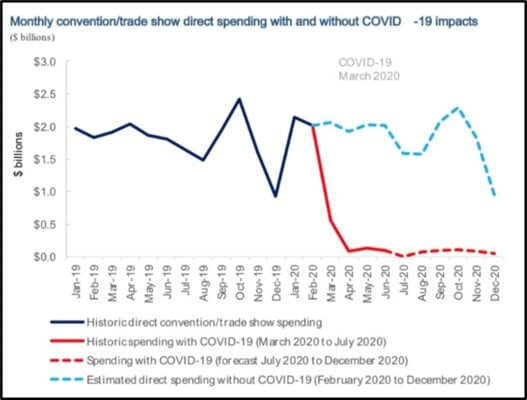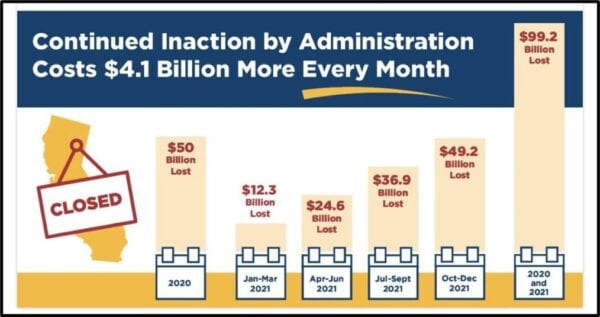The Impact of No Conventions on California’s Economy
Is California dreaming? Tradeshow workers in the state may be dreaming of a time when they were able to earn a full-time living in the convention business, or maybe they are dreaming of a time when they might be able to go back to work. State officials are dreaming if they believe conventions have limited impact on the state economy, and they are delusional if they think they can simply turn a switch and business will return overnight.
California has been losing billions of dollars every month, since the start of the lockdown.
 California was the first state in the country to shut down shows last year; their governor declared a state of emergency on March 4, 2020. Natural Products Expo West was scheduled to open in Anaheim that same day; NPEW was the first major tradeshow to halt move-in and “postpone” their show. Later that month, on March 19, California issued a mandatory, statewide “stay-at-home” order. Moscone Center closed their doors that same day; they were the first major exhibit hall in the country to do so. Some major California convention business lost in 2020 included: NPEW, OFC, AORN, HRS, BIO, E-3, IEEE, Comic-Con, AWS, NACDS, SPI and CTIA.
California was the first state in the country to shut down shows last year; their governor declared a state of emergency on March 4, 2020. Natural Products Expo West was scheduled to open in Anaheim that same day; NPEW was the first major tradeshow to halt move-in and “postpone” their show. Later that month, on March 19, California issued a mandatory, statewide “stay-at-home” order. Moscone Center closed their doors that same day; they were the first major exhibit hall in the country to do so. Some major California convention business lost in 2020 included: NPEW, OFC, AORN, HRS, BIO, E-3, IEEE, Comic-Con, AWS, NACDS, SPI and CTIA.
What was the impact of business meetings and conventions in California during 2019? It was huge! Tradeshows collectively:
- Spent billions of dollars
- Created 155,000 direct jobs
- Supported an additional 112,000 supply chain jobs
- Generated $900 million in state and local taxes
- Attracted 12.9 million visitors
Each attendee spent, on average, $1,744 during his/her stay (includes lodging, food, entertainment and local transportation over a multi-day time frame).
 Last month, on March 4, a state-based coalition representing convention centers, CVBs and local unions contacted the governor’s office requesting a timeline for the reopening of convention business. They stated that, since the start of the lockdown, California has been losing $4.1 billion a month! On April 6, Gov. Newsom declared a state reopening date of June 15. It is a conditional date, subject to the health of the community. Conventions could open, but attendance numbers would be capped at 5,000 until October 1 (although that number could increase depending on testing and vaccination, or decrease if there is a significant spike in the number of cases). Some may consider this to be a positive step, but more needs to be done.
Last month, on March 4, a state-based coalition representing convention centers, CVBs and local unions contacted the governor’s office requesting a timeline for the reopening of convention business. They stated that, since the start of the lockdown, California has been losing $4.1 billion a month! On April 6, Gov. Newsom declared a state reopening date of June 15. It is a conditional date, subject to the health of the community. Conventions could open, but attendance numbers would be capped at 5,000 until October 1 (although that number could increase depending on testing and vaccination, or decrease if there is a significant spike in the number of cases). Some may consider this to be a positive step, but more needs to be done.
The L.A. Convention Center has lost 179 events since the lockdown; the Long Beach CC has lost at least 121 meetings. San Diego, Anaheim and Moscone conventions centers have also experienced a significant loss of business. The SDCC and LBCC are both temporary relocation shelters (tentatively until July 15 and August 2 respectively). In late March, the American Public Transportation Association announced that they were relocating to Orlando, Aug. 31-Sept. 3 for their 2021 meeting. Their official statement read: “The decision to relocate was necessary due to current California restrictions on large gatherings.”
While California has been shut down, other states have been hosting tradeshows; a partial list includes: Arizona, Colorado, Florida, Georgia, Indiana, Iowa, Louisiana, Missouri, North Carolina and Texas—and several of these states began hosting shows as early as last summer. Nevada began hosting shows this month, and World of Concrete is scheduled to open at the LVCC on June 8. Some tradeshows are scheduled to occur in Anaheim in August (and some sporting events before that); and a live VidCon show in Anaheim is scheduled for Oct. 22-24.
California is dreaming if they think a convention cap of 5,000 attendees is a realistic number. The Anaheim Convention Center has more than a million square feet of exhibit space (which equals 200 square feet of space per person, if all were on the show floor at the same time). And while the state says it may increase capacity limits based on testing and vaccination verification, this is both cumbersome and expensive—the state is putting more roadblocks in the way, and possibly driving other associations to more convention-friendly states.
More than any other type of mass gathering, conventions can be a controlled event: it is possible to have a convention, and to keep individuals safe and healthy. It’s time to get back to work. If California is not more proactive in allowing conventions, the state will continue to lose more business.
 Bob McGlincy is director, business management at Willwork Global Event Services. Willwork creates engaging, energized, and exceptional event experiences. He can be contacted at Bob.McGlincy@willwork.com
Bob McGlincy is director, business management at Willwork Global Event Services. Willwork creates engaging, energized, and exceptional event experiences. He can be contacted at Bob.McGlincy@willwork.com






























